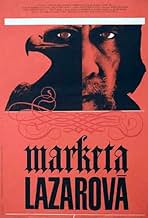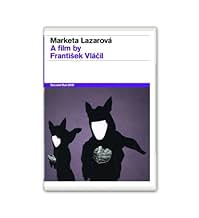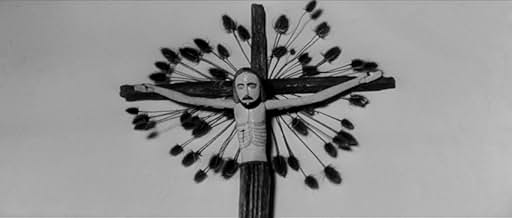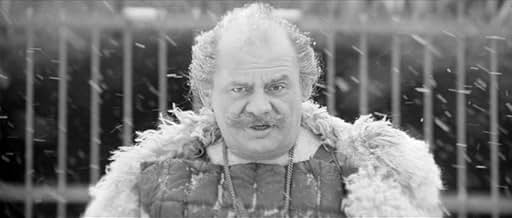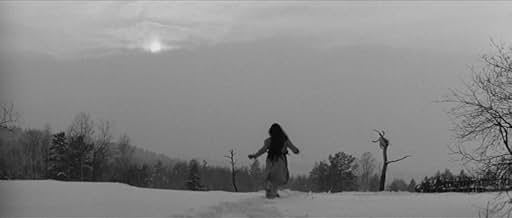AVALIAÇÃO DA IMDb
7,8/10
6,4 mil
SUA AVALIAÇÃO
Um retrato sombrio da mudança do paganismo para o cristianismo na Europa Central medieval: uma jovem virgem comprometida com Deus é sequestrada e estuprada por um homem saqueador que seu pai... Ler tudoUm retrato sombrio da mudança do paganismo para o cristianismo na Europa Central medieval: uma jovem virgem comprometida com Deus é sequestrada e estuprada por um homem saqueador que seu pai religioso procura matar em troca.Um retrato sombrio da mudança do paganismo para o cristianismo na Europa Central medieval: uma jovem virgem comprometida com Deus é sequestrada e estuprada por um homem saqueador que seu pai religioso procura matar em troca.
- Direção
- Roteiristas
- Artistas
- Prêmios
- 2 vitórias e 2 indicações no total
- Direção
- Roteiristas
- Elenco e equipe completos
- Produção, bilheteria e muito mais no IMDbPro
Avaliações em destaque
I appreciate overseas even to notice this film, although I keep my doubt about the translation, for even the simplified movie dialogues are high-art and historizing. The film is based on Vladislav Vancura's brilliant novel (of the same name) its language level makes it untranslatable. It apparently caused my colleagues-in-comment some misunderstandings, for sure Czech King was no German in that time(even the christianity didn't come in our land germanways), only the noble man and his kidnapped son were.
This film is especially remarkable due to successful conversion of a great book into the great film (I don't recall many other examples at this level) and due to its capture of medieval. I hate medieval films with clean, stylish and crafty interiors, clothes etc. and bright light, for medieval was DARK, HARSH and DIRTY. What's the best part, Kozlik and Lazar were not just family-chieftains or family-heads, they were NOBLE MEN (feudals) and no matter whether they looked (and acted) like prowlers or not. Neither manners nor dresses were the significance of nobles in early medieval, the sword was (which no commoner was allowed to posses), better say swords and estates were.
This film is basically about weakness and strength in men. Lazar is thief and coward, kind of vulture, but Kozlik with his sons represents the willful and harsh power and bravery that summons an admiration of a sort, for they fear only the God, what makes them better christians than the sneaky Lazar jaws-full-of-Jesus.
Marketa, the unspoiled sweet child resembles all the clear, bright and pure in this world (and the only positive aspect of Lazar's sorry life), and is spoiled as everything clean and pure in this world might be. And she's devoted, first to God, then to earthly Mikolas.
I love the metaphore with zealot and little lamb, the connection between Marketa and the God's beast is obvious. Agnus Dei is another clear and bright to be tainted and consumpted by wild Kozlik's House.
And the sound and music, that's the world if its own, there's no music but sudden choir impacts!
This film is especially remarkable due to successful conversion of a great book into the great film (I don't recall many other examples at this level) and due to its capture of medieval. I hate medieval films with clean, stylish and crafty interiors, clothes etc. and bright light, for medieval was DARK, HARSH and DIRTY. What's the best part, Kozlik and Lazar were not just family-chieftains or family-heads, they were NOBLE MEN (feudals) and no matter whether they looked (and acted) like prowlers or not. Neither manners nor dresses were the significance of nobles in early medieval, the sword was (which no commoner was allowed to posses), better say swords and estates were.
This film is basically about weakness and strength in men. Lazar is thief and coward, kind of vulture, but Kozlik with his sons represents the willful and harsh power and bravery that summons an admiration of a sort, for they fear only the God, what makes them better christians than the sneaky Lazar jaws-full-of-Jesus.
Marketa, the unspoiled sweet child resembles all the clear, bright and pure in this world (and the only positive aspect of Lazar's sorry life), and is spoiled as everything clean and pure in this world might be. And she's devoted, first to God, then to earthly Mikolas.
I love the metaphore with zealot and little lamb, the connection between Marketa and the God's beast is obvious. Agnus Dei is another clear and bright to be tainted and consumpted by wild Kozlik's House.
And the sound and music, that's the world if its own, there's no music but sudden choir impacts!
I bought the Second Run DVD, after reading about how this epic was considered the best Czech film, ever.
To be honest, not many other contenders spring to mind. And, who voted? As it was on special offer and I am a sucker indeed for that Russian style of gritty monochrome composition and beauty, how could I resist?
I'm on its second play and I'm no nearer following the story. There is undoubtedly one. Am I too overawed by imagery that I could only dream of? (even if I were able to!) Is it the savagery and feel of a certain reality?
I don't know. I can sense, however, an art film made with passion and unbounded imagination. Of folklore, both in a historical sense and a cultural one and of religious rebellion. Like Kurosawa at his best, an immediacy and connection. Yet, it is also dreamlike and distant, with an air of mysticism that I found increasingly confusing. The length of film means that by halfway through I've no idea what is going on, but am still enjoying what I see.
Unfortunately, I have docked a mark for the forced, electronically induced echo on the dialogue that probably is supposed to denote that other worldly strangeness. It seems to seep in and hang about, its constant use here cheapens the effect to being a bit of a pain. Whereas Kurosawa used that SFX so effectively on, say Roshomon, by using just once or twice.
I could see elements of the Brazilian 'Black God, White Devil' and like others have commented, Kurosawa's 'Seven Samurai' and Tarkov's 'Andrei Rublev'. Maybe some of the black magic in Bergman's late medieval classics, such as 'The Virgin Spring' and 'The Seventh Seal'. But more psychotic, more manic and disturbing than all these put together. Like madness itself, there is a real beauty deeply ingrained amongst the mayhem.
My conclusion would have to be that if you get the chance, go for it. Take it with a large pinch of salt and sprinkle sparingly. None of it is truly horrific or unpalatable to most adults and don't worry if you don't "get it". Be slightly proud and immodest that you've found a tarnished gem that hardly anyone else will have seen or are ever likely to.
To be honest, not many other contenders spring to mind. And, who voted? As it was on special offer and I am a sucker indeed for that Russian style of gritty monochrome composition and beauty, how could I resist?
I'm on its second play and I'm no nearer following the story. There is undoubtedly one. Am I too overawed by imagery that I could only dream of? (even if I were able to!) Is it the savagery and feel of a certain reality?
I don't know. I can sense, however, an art film made with passion and unbounded imagination. Of folklore, both in a historical sense and a cultural one and of religious rebellion. Like Kurosawa at his best, an immediacy and connection. Yet, it is also dreamlike and distant, with an air of mysticism that I found increasingly confusing. The length of film means that by halfway through I've no idea what is going on, but am still enjoying what I see.
Unfortunately, I have docked a mark for the forced, electronically induced echo on the dialogue that probably is supposed to denote that other worldly strangeness. It seems to seep in and hang about, its constant use here cheapens the effect to being a bit of a pain. Whereas Kurosawa used that SFX so effectively on, say Roshomon, by using just once or twice.
I could see elements of the Brazilian 'Black God, White Devil' and like others have commented, Kurosawa's 'Seven Samurai' and Tarkov's 'Andrei Rublev'. Maybe some of the black magic in Bergman's late medieval classics, such as 'The Virgin Spring' and 'The Seventh Seal'. But more psychotic, more manic and disturbing than all these put together. Like madness itself, there is a real beauty deeply ingrained amongst the mayhem.
My conclusion would have to be that if you get the chance, go for it. Take it with a large pinch of salt and sprinkle sparingly. None of it is truly horrific or unpalatable to most adults and don't worry if you don't "get it". Be slightly proud and immodest that you've found a tarnished gem that hardly anyone else will have seen or are ever likely to.
Just wanted to add a note about the apparent slightly negative comments about the visual quality of the Second Run DVD release - well, how petty can you get! This astonishing film is incredible to look at and is surely one of the most beautiful films ever made though not, it has to be said, in a conventional sense. Although some scenes feature genuinely authentic brutality, there is a strange dream-like quality to the film's look. The story itself demands total concentration throughout but, by the end, you will be fully rewarded for your efforts. A poetic masterpiece. Great work again by Second Run for making such a cinematic rarity available to view.
"Marketa Lazarova" was a film I saw in 1970 at a small film theater in Minneapolis, Minnesota. It left an indelible memory, and I've spent years trying to find a way to see it again. At least once a year, I find a note I left about a phone call I've made to some obscure library or other such place in the hope of finding a way to see it.
The film won an Academy Award, and it should be remembered. It is stunning in black and white; the story is remarkable in its content and direction.
If anyone has ideas about how we fans can possibly revive this movie, we should try to do so. It is worth all the trouble and more just to see it again and again.
The film won an Academy Award, and it should be remembered. It is stunning in black and white; the story is remarkable in its content and direction.
If anyone has ideas about how we fans can possibly revive this movie, we should try to do so. It is worth all the trouble and more just to see it again and again.
Man was a beast before the Middle Ages, but now it was one racked with guilt. Violence was the constant and would continue to be the shaper of worlds but, with the advent of this new religion preaching mercy and penitence, it was probably the first time that this violence was experienced within unprecedented, new frameworks. What had been passed through the blood for centuries in the Teutonic woods as the only means of arranging the world in some order, this instinctive violence, was now felt to be abominable.
In this sense, the religious angst of the medieval man comes from trying to conciliate that ancestral world where carving a blood eagle on the back of a fallen chieftain pleased the gods, with the new ideas of perceiving it, where sins had to be atoned for.
Here we get the tumultuous chronicle of this, the writing of the middle part of history.
We get baroque, medieval art, steeped in religious terror and ancestral guilt. Chances are there's a slew of medieval films out there, but probably not one that is as pungent, with a single exception. We encounter this cruel, pitiless hell on earth where life is meaningless and crazed gods roaming it exact terrible, ironic tolls on the human soul, ten years later in Diabel, by the hand of a certified madman this time.
Spiritually I couldn't be farther apart from this godless vision of tortured human beings, essentially Christian. But as an experience to dwell upon and inhabit, the film offers no quarter. It's a better Valhalla Rising, thirty years before.
What new frameworks here though, how best to experience the torture of the medieval man? The director finds the answer in the Czech New Wave.
The intertitle that opens this delineates what follows as a saga, an epic story of murder and intrigue. The masterstroke here lies in how this saga is told, in fragmenting it from a linear notion where time is a succession (which is the artifice of history) and presenting us with those fragments as a vivid experience of a life bled for and anguished. Which is to say, Marketa Lazarova is not the history of what transpired but the memory of it, which is then arranged into a story.
The camera then sees inside this story deeper than any bard did. And what it sees is that these passions and sufferings are not linear, therefore building up to something or anticipated to come to an end that would justify the pain, but an exponential cycle turning indifferently and without pattern.
Yet here is where the film falters. Having broken this up, the film shies away from the opportunity to look directly at what hides behind it, if anything, and insists we read this as a rhapsody where it's not impossible to consider the degenerate as cruel, flawed heroes who defied the king's rule. Bombastic music swells up in crescendos now and then to remind us that all this is horrible, but fundamentally tragic.
This may be a quibble however. It's a harrowing experience watching these men, small and insignificant at the face of violence, struggle with a pain and madness immemorial, that predates their existence. Omens of skaldic doom abound here, black crows in the bony branches of trees. Whatever they signify or not, whether the gods cackle at all this or are indifferently absent, these sights curdle the blood.
In this sense, the religious angst of the medieval man comes from trying to conciliate that ancestral world where carving a blood eagle on the back of a fallen chieftain pleased the gods, with the new ideas of perceiving it, where sins had to be atoned for.
Here we get the tumultuous chronicle of this, the writing of the middle part of history.
We get baroque, medieval art, steeped in religious terror and ancestral guilt. Chances are there's a slew of medieval films out there, but probably not one that is as pungent, with a single exception. We encounter this cruel, pitiless hell on earth where life is meaningless and crazed gods roaming it exact terrible, ironic tolls on the human soul, ten years later in Diabel, by the hand of a certified madman this time.
Spiritually I couldn't be farther apart from this godless vision of tortured human beings, essentially Christian. But as an experience to dwell upon and inhabit, the film offers no quarter. It's a better Valhalla Rising, thirty years before.
What new frameworks here though, how best to experience the torture of the medieval man? The director finds the answer in the Czech New Wave.
The intertitle that opens this delineates what follows as a saga, an epic story of murder and intrigue. The masterstroke here lies in how this saga is told, in fragmenting it from a linear notion where time is a succession (which is the artifice of history) and presenting us with those fragments as a vivid experience of a life bled for and anguished. Which is to say, Marketa Lazarova is not the history of what transpired but the memory of it, which is then arranged into a story.
The camera then sees inside this story deeper than any bard did. And what it sees is that these passions and sufferings are not linear, therefore building up to something or anticipated to come to an end that would justify the pain, but an exponential cycle turning indifferently and without pattern.
Yet here is where the film falters. Having broken this up, the film shies away from the opportunity to look directly at what hides behind it, if anything, and insists we read this as a rhapsody where it's not impossible to consider the degenerate as cruel, flawed heroes who defied the king's rule. Bombastic music swells up in crescendos now and then to remind us that all this is horrible, but fundamentally tragic.
This may be a quibble however. It's a harrowing experience watching these men, small and insignificant at the face of violence, struggle with a pain and madness immemorial, that predates their existence. Omens of skaldic doom abound here, black crows in the bony branches of trees. Whatever they signify or not, whether the gods cackle at all this or are indifferently absent, these sights curdle the blood.
Você sabia?
- CuriosidadesFrantisek Vlácil not only had the clothes painstakingly researched and hand-sewn, he had the cast live in the forest for the two years of shooting so they could get into the 13th century mindset.
- Erros de gravaçãoIn a scene where Marketa observes a reindeer in the forest, you can see a director Frantisek Vlácil in jacket in the left of the frame. He was actually trying to scare deer, because they didn't want to move. This could be seen only on some of the Blu-Ray and DVD versions.
- Versões alternativasThe UK release was cut, a cut was required to remove sight of a snake being stabbed and rearing up in pain, in order to obtain a 15 classification. The cut was made on the basis of BBFC policy on genuine animal cruelty. An uncut classification was not available.
- ConexõesEdited into CzechMate: In Search of Jirí Menzel (2018)
Principais escolhas
Faça login para avaliar e ver a lista de recomendações personalizadas
- How long is Marketa Lazarová?Fornecido pela Alexa
Detalhes
- Tempo de duração2 horas 42 minutos
- Cor
- Mixagem de som
- Proporção
- 2.35 : 1
Contribua para esta página
Sugerir uma alteração ou adicionar conteúdo ausente

Principal brecha
By what name was Marketa Lazarová (1967) officially released in India in English?
Responda
![Assistir a Trailer [OV]](https://m.media-amazon.com/images/M/MV5BOGZhMmFmMGQtNGZhMi00M2QzLWExMjItZjJkZTVhMmEzYzJjXkEyXkFqcGdeQXRyYW5zY29kZS13b3JrZmxvdw@@._V1_QL75_UX500_CR0)
